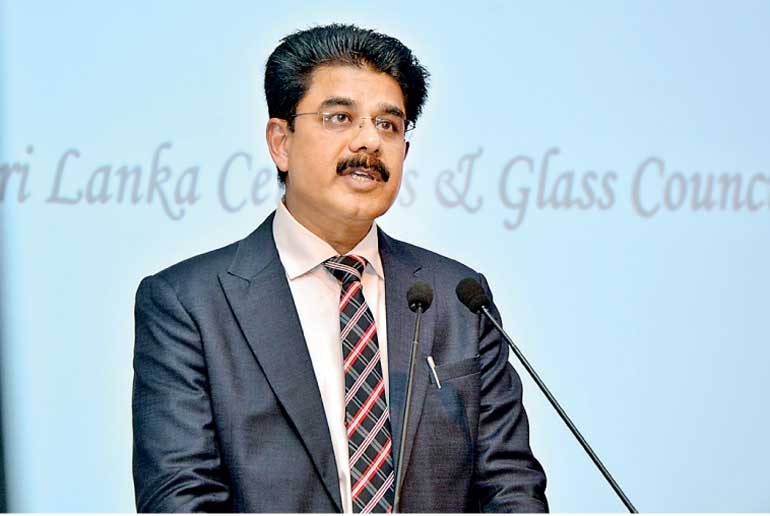Wednesday Feb 25, 2026
Wednesday Feb 25, 2026
Tuesday, 6 March 2018 00:17 - - {{hitsCtrl.values.hits}}

Managing Director-CEO of Piramal Glass Ceylon and President of Sri Lanka Ceramic and Glass Council (SLCGC) Sanjay Tiwari
– Pic by Upul Abayasekara
Given the support from the Government, Sri Lanka Ceramics and Glass Council yesterday expressed that they were ready to invest further on capacities and capabilities to service the country’s requirements, as well as to bring in substantial revenue from exports.
Listing out a number of requests at the inauguration of Sri Lanka Ceramics and Glass Council Symposium 2018 held yesterday, the stakeholders called for Government’s intervention to support the industry to move forward.
“We assure you that the industry is further ready to invest for capacity expansion and technology upgrades if needed, provided we get your support on issues brought to your kind notice,” Piramal Glass Ceylon PLC CEO and Sri Lanka Ceramics and Glass Council 2018 Symposium President Sanjay Tiwari appealed to the Government.
According to Tiwari, the industry has an annual turnover of over Rs. 50 billion at present, out of which 30% is exports to over 20 countries. The industry has also generated over 22,000 direct employment jobs, while also creating 50,000 indirect employment jobs. He said that there were 20 large-scale manufacturing facilities and over 300 small-scale factories.
Acknowledging that there was a substantial growth in the red clay roofing tiles market in the last two years after President Sirisena banned asbestos, Tiwari however pointed out that the withdrawal of the ban on asbestos has shaken up the red clay roof tile industry and their future was bleak.
“The industry (red clay roofing tiles) has invested in technology and capacity to service the country’s requirements. However, with the withdrawal of the ban on asbestos, the red clay roof tile industry future looks uncertain. We request to re-impose ban of asbestos or to find a way to safeguard the red clay roof tile industry, which has taken a hit with certain regulations,” he stressed.
He further said that the replacement of 14% Corporate Income Tax rate on profits from exports to 28%, announced in the last Budget, has given negative sentiments to the industry and called for President Sirisena’s direct attention to the matter.
“On one side, the Government through Export Development Board (EDB) is encouraging companies to push for more exports. However, charging higher income tax rate on profit from exports will not only discourage our industry and reduce exports, but will have negative impacts on overall exports out of the country. Our selling prices in the export market are very competitive and thereby we have lower margins. We have made representations through EDB and had several deliberations on the subject. This calls for your attention, sir,” Tiwari requested.
Thereby, he requested the Government to continue with the existing income tax rate of 14% on profits from exports for companies having exports less than 80% of total sales.
As furnace oil prices are not linked to the world crude oil prices, he said it prevents the industry from having a level playfield with their global competitors. “Our biggest limitation is fuel pricing. We request to the Government to introduce a formula based pricing for furnace oil linked to world crude oil prices,” Tiwari suggested.
Highlighting that the industry has a huge potential of mining ball clay in Kalutara, and silica deposits in Madampe and in the Northern Province, he urged Government to give approval for mining, assuring that the industry was ready to take the responsibility to perform mining as per Government guidelines.
“Over 60% of the floor tiles requirement of the country is serviced through imports. Companies are ready to invest, but due to non-availability and mining restrictions on ball clay, the expansions are not happening. We have a huge potential of mining ball clay in Kalutara, where we have over 8,000 acres of paddy fields, but with the existence of ball clay, the harvest also is not productive. The industry is ready to take the responsibility to perform mining as per Government guidelines,” Tiwari said.
He asserted that the complex approval procedures and restrictions was always an issue for many sectors. “Non-availability of consistent quality of kaolin is another issue. We have ample deposits, but the quality requirements are a constraint,” he added.
Calling to reinstate the cess removed on sanitary ware in 2017, to save the SSI which has heavily invested in the manufacturing, Tiwari also urged the Government to enforce the anti-dumping regulation to prevent dumping from China and India.
The 62 members of the council manufacture tableware porcelain, bone china, fine china, floor tiles, wall tiles, bath ware, glass containers, earthenware, ornamental ware, red clay-roofing tiles and terra-cotta floor tiles.
(C de S)